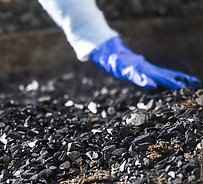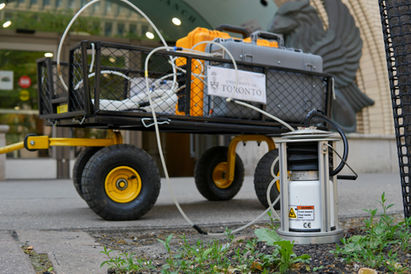
Toronto biochar tree Experiment
In collaboration with the City of Toronto, the Thomas Lab is currently testing the effects of biochar on city-managed trees. This research will assess the effects of biofertilizer and biochar soil amendments on tree establishment, in addition to soil and tree health. The five most common species planted on "hard surface" and “soft surface” sites in Toronto are integrated into this project, including hackberry (Celtis occidentalis), honey locust (Gleditsia triacanthos), Freeman maple (Acer x freemanii), elm (Ulmus spp., mainly U. americana hybrids), and Kentucky coffeetree (Gymnocladus dioicus). The biochar in use for this project is created through the pyrolysis of wood waste material, and has been provided by industry partners Titan Clean Energy Projects and Haliburton Biochar. For the soft surface Toronto tree planting trials, deactivated brewer’s yeast (Saccharomyces cerevisiae) was selected as the biofertilizer of choice, as it is a ubiquitous, nutrient-rich by-product of the beer brewing industry with little market value, and is widely available for urban soil fertilizer applications. If trial results are successful, this waste product has great potential
to contribute to a circular economy. This study represents the first large-scale designed experiment of biochar effects on street trees and soft surface tree plantings globally, with ~500 Toronto street trees included in the study.
What is Biochar?
Biochar refers to a type of charcoal created by the pyrolysis of organic waste materials and
intended for use as a soil amendment. It's different from cooking charcoal in that the
energy-rich bio-oils are removed, leaving a highly porous solid material. Biochar is analogous
to fire residues from natural wildfires, so many plants and other organisms are pre-adapted to
biochar.
Benefits of Biochar
Street trees in Toronto face numerous anthropogenic stresses. Soil compaction greatly reduces the aeration of the soil and its water-holding capacity. Salts applied during the wintertime often enter the soil around trees, having direct toxic effects and reducing nutrient availability. Biochar increases soil water and nutrient retention and also helps remove sodium ions from the soil solution, combating the effects of high soil salinity. A particular advantage of biochar is its resistance to decomposition, which allows biochar to maintain soil porosity and resist soil compaction in the long term. In other systems, biochar also enhances soil microbial activity and diversity. We thus expect biochar to be particularly beneficial for street trees.
What is Bio Fertilizer?
Biofertilizer refers to an organic fertilizer derived from microbial organisms. Main types of biofertilizers include nitrogen-fixing bacteria, phosphorus biofertilizers, compost, mycorrhizal fungi, and yeast.
What are the benefits of bio fertilizer?
Biofertilizers promote plant growth through the introduction of organic materials with high plant nutrient content to revitalize soil microbial communities. Deactivated brewers' yeast (Saccharomyces cerevisiae) has been shown to enhance soil health by increasing microbial diversity, enhancing nutrient availability in soils, and improving overall plant biomass. Since deactivated brewers' yeast is an organic material, it offers a sustainable alternative to chemically synthesized fertilizers.
Overall Goals of the Study
Biochar and biofertilizer provide an opportunity to divert food and urban wood waste into a sustainable resource that promotes the growth and health of street trees in urban areas. Additional project components include evaluating the use of urban wood waste as a biochar feedstock, conducting life-cycle analysis and economic evaluations of biochar use and production in urban forestry, greenhouse gas emissions associated with urban forest waste, and the potential broad-scale benefits to urban forest ecosystem function. Parallel projects are also underway in Québec City and Edmonton, enabling a broader evaluation of the potential for biochar in urban forestry across Canada.


For further information or to report concerns regarding this project, please contact 311 or refer to the City of Toronto website: www.toronto.ca/trees/



